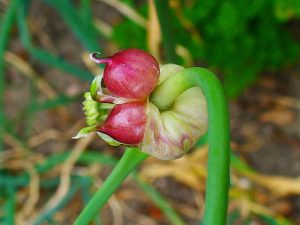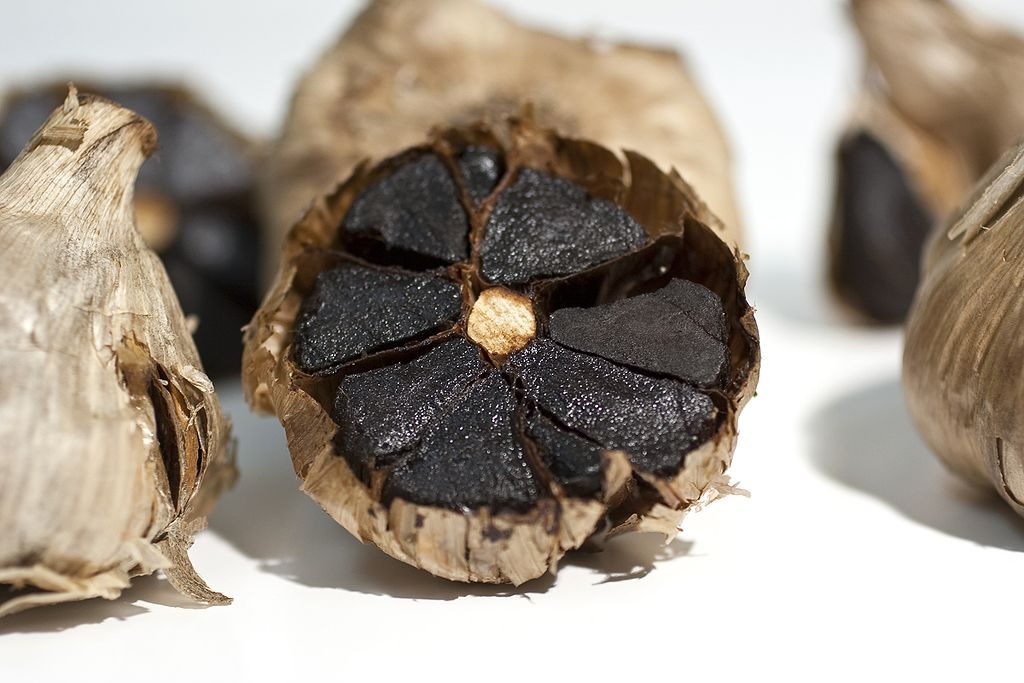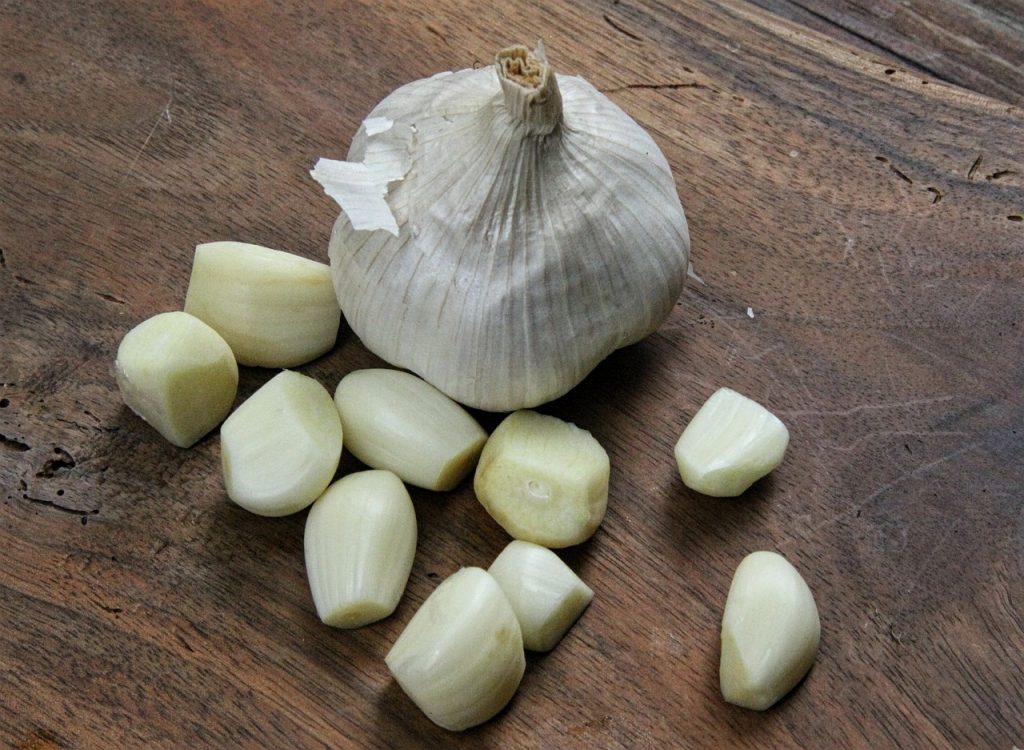Early reseach indicates that garlic may help with respiratory infections and act as an overall immune booster.

- Protect from respiratory infections. Garlic seems to reduce the symptoms and your chances of catching a cold, flu, and other respiratory infections.
- Enhance overall immune function. Garlic appears to be capable of stimulating immune cell activity.
Overview
Garlic (Allium sativum) is an herb related to the onion that’s known for its pungent-tasting cloves. Garlic has been in use for thousands of years both in food preparation and as medicine. Indeed, raw garlic remains a popular folk remedy for a wide variety of health disorders and infections in many different countries.
Today, garlic supplements are a popular way of managing high blood pressure and cholesterol, and atherosclerosis. In addition, garlic is also growing in popularity as an immune system booster, particularly for fighting cold and flu infections, and garlic oil is often used as a topical treatment for fungal and bacterial infections such as athlete’s foot.
A growing number of studies indicate that garlic possesses multiple immune-related benefits, such as antibacterial, antiviral, and antifungal activity. However, experts stress that it is far too early to say anything conclusive about its use as an immune booster.
How Garlic Might Help with Immunity
Immunomodulatory activity
Garlic and its constituents have been demonstrated to enhance immune system function in two major ways: 1
- Stimulating the activity of immune cells such as natural killer (NK) cells, macrophages, lymphocytes, dendritic cells, and eosinophils
- Increasing or inhibiting the production of various cytokines that control the immune response and inflammation
Antioxidant activity
Reactive oxygen species (ROS) can not only cause damage to immune cells but also be involved in other illness-causing processes. All garlic preparations, and especially aged garlic, contain antioxidant compounds that can help neutralize ROS. 2
Antipathogenic activity
Garlic preparations – and allicin in particular – have been demonstrated to have antibacterial, antifungal, and antiviral properties, which can help protect the body from the three main types of pathogens. 3
Garlic Uses & Benefits for Immunity
As an immune system booster, garlic is most commonly used to ward off cold and flu infections – a use for which there is some early clinical research evidence.
In addition, garlic supplements are also used to help with allergies, bacterial and fungal infections, fever, cough, stomach problems, sinus issues, and for many other conditions. However, there is little research evidence to back these uses, with the exception of some animal and cell culture studies.
Garlic supplements can be made from normal (fresh) or aged (also called black) garlic. The debate on which one works best as an immune booster is ongoing: some experts suggest that fresh garlic is superior because it contains higher levels of allicin, which is believed to be the main active ingredient, while others believe that black garlic is better because it contains higher levels of antioxidants and other compounds. 4

Research
Animal & Petri Dish Research
Animal and cell culture studies of garlic indicate that:
- It possesses antibacterial, antifungal, and antiviral properties 5
- Aged garlic extract may help normalize immune function, prevent stress-induced immune system suppression, increase natural killer (NK) cell activity, and affect cytokine production 6 7 8
- Alliin, a compound found in garlic, may enhance phagocytosis and change cytokine levels 9
Human Research
Although clinical research is scarce and has been criticized for its quality, studies indicate that garlic may help ward off and alleviate colds and other respiratory infections.
Garlic supplementation may reduce risk of catching a cold infection
This randomized, double-blind, placebo-controlled study examined the use of a garlic supplement for fighting cold infections. A total of 146 people were given placebo or garlic capsules daily for 12 weeks in the winter. The garlic group had fewer colds than placebo (24 vs 65) and shorter cold duration (4.63 vs 5.63 days).
- The researchers concluded that: “An allicin-containing supplement can prevent attack by the common cold virus.” 10
Aged garlic extract (2.56 g) may help fight cold and flu infections
In this randomized, double-blind, placebo-controlled study, 120 people were given aged garlic extract (2.56 g) or placebo daily for 90 days. The garlic group experienced a rise in two white blood cell subtypes – γδ-T cells and natural killer (NK) cells – after 45 days. In addition, they had reduced severity of cold and flu infections, as noted by fewer symptoms, fewer days sick, and fewer days of work and school missed.
- The researchers concluded that: “supplementation of the diet with aged garlic extract may enhance immune cell function and that this may be responsible, in part, for reduced severity of colds and flu.”11
Garlic tablets (300-600 mg) appear to reduce acute respiratory infections in children
This two-part study examined the use of garlic tablets (allicor) for acute respiratory diseases (ARD) in children. In part one, 172 children (aged 7-16) were given garlic tablets (600 mg) daily for 5 months and compared to 468 children given no treatment. The garlic group had 2-4 times fewer ARD infections.
In part two, 156 children were given placebo, benzimidazole, or garlic tablets (300 mg) daily for 5 months. The garlic group had 1.7 times fewer infections than placebo and 2.4 times fewer than benzimidazole.
- The researchers concluded that “allicor is effective for non-specific prevention of acute respiratory infections in children and has no side effects.”12
Dosage for Immunity
- Becauase clinical studies use different garlic perparations, it’s difficult to suggest a dose
- Most garlic supplements come in the form of garlic extract that is equivalent to 1 g of garlic bulb, taken 2-4 times daily
- The dosage used for general health is around 400 – 600 mg
Available Forms
Garlic supplements can come in the form of tablets, capsules, and oil. They are usually made from one of three garlic preparations:
- Garlic extract. Produced from fresh garlic, this extract is usually sold in capsules. Notable for having the highest levels of allicin, which is currently believed to be the main active ingredient.
- Aged garlic extract. Garlic that has been aged – a process which reduces its odor and also changes the chemical composition.
- Black garlic extract. A special version of aged garlic that is kept in specific humidity and temperature conditions to turn the garlic black.
Supplements in Review Says
- Garlic extract 1,000 mg for immunity.
Garlic seems to have strong potential as an immunity booster. Although research is still in its early stages, the positive findings – coupled with garlic’s long history of use as a medicinal herb – point to tangible immunity benefits. In particular, it seems that garlic can be helpful for colds and other respiratory infections.
It’s not yet clear which form and dosage is best. It’s too early to say whether normal or aged garlic is superior; as for dosage, it’s best to stick to 1000 mg since that is the dose used by most supplements.

Leave a Reply